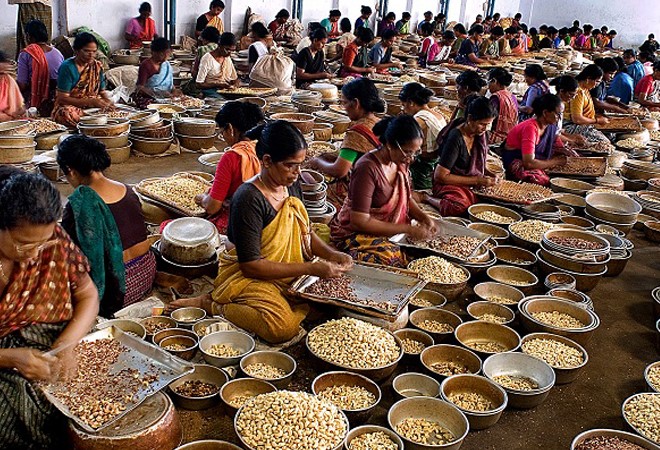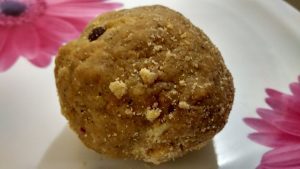
Tirupati laddu may have famed cashew from Kerala again

Facing an unprecedented crisis, Kerala’s famed cashew sector could get a massive fillip if Tirumala Tirupati Devasthanam (TTD) decides to procure the nuts as an ingredient in the delicious laddus, a favourite offering to devotees.
Early estimate says TTD requires at least 2,500 kg of cashew nuts every day. A senior TTD official told The Federal that they were keen to buy cashew from the Kerala Cashew Development Corporation (KCDC), having been impressed by the overall quality of the cashew.
“We are really impressed by the quality of the cashew and hence wave asked KCDC to come up with an offer. However, a final decision is yet to be taken,” said the official.
It’s learnt that senior TTD officials had already visited the KCDC office at Kollam, a port city in southern Kerala, known for its best quality crop, as part of the process.
S Jayamohan, KCDC chairman, says the corporation can provide 2,500 kg of cashew nuts per day once the deal is signed.
The development comes amid KCDC’s hectic plans to revive the crisis-hit cashew industry of Kollam, once the cashew processing capital of the world, after discussions with the state government.
Unavailability of raw cashew nuts
“Unavailability of raw cashew nuts is a huge problem affecting the industry. Earlier, there were no cashew processing units in all cashew-grown countries. That is not the case now. Most cashew nations have mechanised processing units and raw nuts will be sent to those countries for processing, restricting the chances of cashew coming to Kollam. The pandemic too has aggravated the crisis,” Jayamohan added.
The TTD has also asked KCDC to give them split cashews without additional cost, said the official, adding that if the split ones get easily fit into laddus.
“There are several procedures the Tirupati Venkateshwara temple must follow before finalising agreements. Being a government organisation, in this case, it has to be presented to the TTD Board for their approval,” said the officer.
According to temple authorities, about 3 lakh laddus are sold daily. The Tirupati laddu contains other ingredients such as cardamom and Bengal gram, along with cashew nuts.

Not the first time
However, this is not the first time Kerala cashews are used to make the Tirupati laddu. In 2020-21, the KCDC had supplied 20 tonne of cashews to the temple.
“But private parties took over from them as they would undercut KCDC by offering to sell their produce at lower prices,” KCDC chairman S Jayamohan told The Federal.
Also read: Kerala’s hi-tech Kuriyottumala dairy, livestock farm set to open for tourists
In 2021, after KCDC inked a deal with the TTD, many other temples expressed interest to use their cashews in their ‘prasadams’ (offerings).
TTD’s renewed interest in KCDC cashew nuts is expected to boost their business. The industry has been going through a crisis since 2016 when the Centre imposed an import duty of 9.36 per cent on raw cashew nuts. This led to significant cashew imports while there was no increase in the price of processed cashews, leaving the industry at major economic risk.
Crisis-ridden times
For many decades, raw cashew has been imported from African countries at a high cost, and later they get processed into kernels. But the cost of processing too has shot up as hundreds of labourers are needed because, in Kollam, the hand-shelling method is still operational.
The sector took a severe hit when the Kerala government hiked the wages of workers, combined with growing competition from mechanically produced cheaper varieties of Vietnamese processed cashew.
Unlike machine-operated nuts, the cashew of Kollam is separated using bare hands, which makes it a sought-after product in the international market.
Believe it or not, Kollam was the largest processed cashew exporter 15 years ago, but that is not the case today. In 2011, if there were 600 cashew processing units in Kollam, then the number came down to below 200 in 2020.
Says J Rajmohan Pillai, chairman of the Beta group and manufacturer of Nutking, who belonged to the well-known cashew exporting family of Kollam, “About 8 lakh tonne of raw cashews used to be imported to Kollam for processing every year and 80 per cent of India’s export quality cashew kernels were prepared in Kollam. Kollam remained the cashew capital of India from the 1930s to 2000. But it lost its primary position in the market due to the high production cost in Kollam. As other states got into mechanisation, steep import and processing costs have affected the industry. Karnataka, Tamil Nadu, Andhra Pradesh, Vietnam, and East Africa are putting a lot of pressure on the cashew sector in Kollam,” said Pillai.
For a sector that is trying to wriggle its way back, the Tirupati deal could be a major boost.

